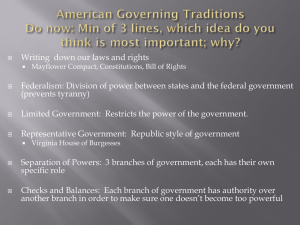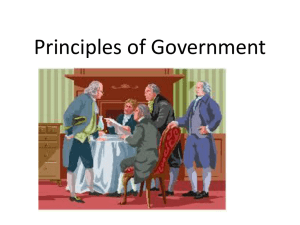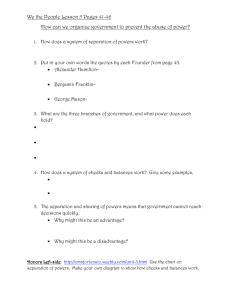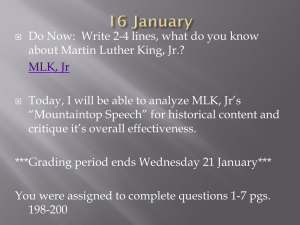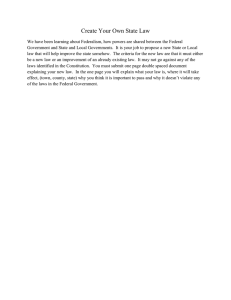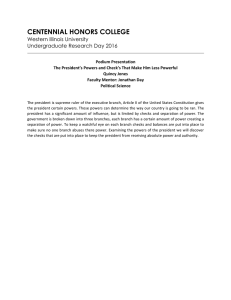Do Now: In a min. of 3 lines: What... ideas have influenced you to becoming the
advertisement
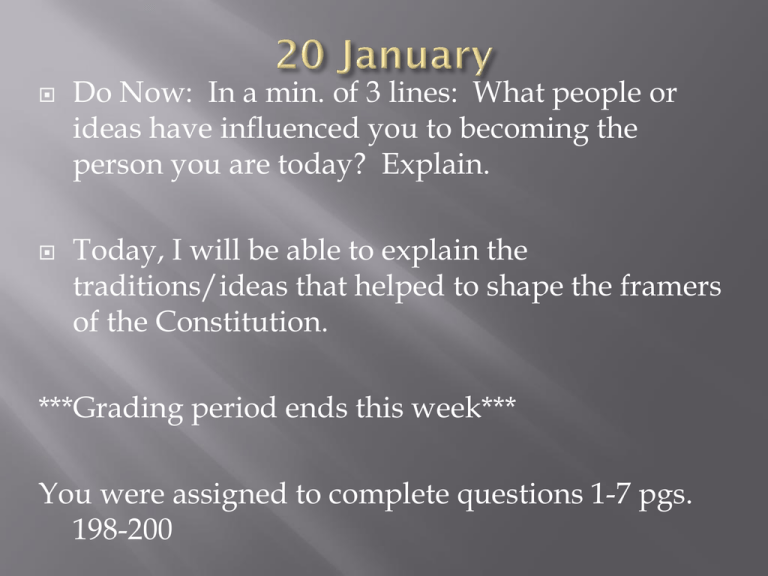
Do Now: In a min. of 3 lines: What people or ideas have influenced you to becoming the person you are today? Explain. Today, I will be able to explain the traditions/ideas that helped to shape the framers of the Constitution. ***Grading period ends this week*** You were assigned to complete questions 1-7 pgs. 198-200 19: Observance of MLK, Jr. Day 20: Discussion of governing traditions; notes and finish 7.3 (there will be a quiz on Thursday) 21: Review Federalism, Checks/Balances, and Separation of Powers; Begin reading 204-6 (handout) 22: Quiz on Federalism and Separation of Powers; complete 7.4 handout 23: Federalists v Antifederalists; handout, reading, and possibly video. If you are sitting in a group, you are expected to: Remain on task Read the text aloud Work together to answer questions 8-18 If you receive 2 warnings, your group will be dissolved and the assignment is to be completed independently. If you remain off-task from that point you will receive a 0 You will be given 25 mins to complete the back. If your group finishes early, begin preparing for the next quiz pg. 200 and pg. 202 (organizer). Writing down our laws and rights Mayflower Compact, Constitutions, Bill of Rights Federalism: Division of power between states and the federal government (prevents tyranny) Limited Government: Restricts the power of the government. Representative Government: Republic style of government Virginia House of Burgesses Separation of Powers: 3 branches of government, each has their own specific role Checks and Balances: Each branch of government has authority over another branch in order to make sure one doesn’t become too powerful British European philosophers Greeks Romans Magna Carta (Grand Charter 1215), restricts the authority of the British monarch, stated that nobles had specific rights. English Bill of Rights: 1689, part of the Glorious Revolution Trial by jury (6th) Protection for Cruel and Unusual Punishment (8th) Right to bear arms (2nd) Hobbes known discussing the state of nature (what’s life like without government? “Short, Nasty, and Brutish…”) Locke: Social Contract, government is to protect natural rights of the citizens Separation of Powers: Divide government into 3 branches, drastically reduces the chances of tyranny…WHY Reserved: Powers that belong to the state Delegated: Powers that belong to the federal government Concurrent: Shared powers Each branch keeps the other in “check”, by holding authority over the others Congress can pass bills, but the President can veto Congress can override a veto H.O.R. can impeach the President or federal judges Judicial appoints made by the President must be approved by the Senate The Courts will have the authority to deem laws and actions “unconstitutional” after the Marbury vs. Madison ruling.

